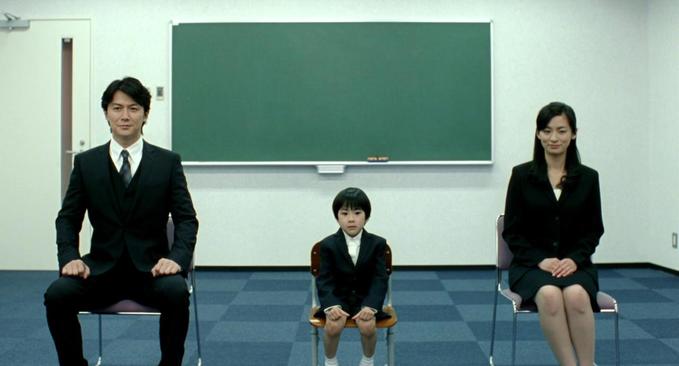LIKE FATHER, LIKE SON
****
Director: Hirokazu Kore-eda
Screenwriter: Hirokazu Kore-eda
Principal cast:
Masaharu Fukuyama
Machiko Ono
Lily Franky
Yôko Maki
Country: Japan
Classification: PG
Runtime: 121 mins.
Australian release date: 17 April 2014
Previewed at: Hoyts Entertainment Quarter, Moore Park, Sydney, on 8 April 2014.
Like Father, Like Son is the latest film from the acclaimed Japanese director Hirokazu Kore-eda, whose previous films Nobody Knows, Still Walking and I Wish, all deal with families who have something monumental to deal with. In this case, the mammoth issue is one that is enough to tear at anyone’s heart strings, regardless of whether one is a parent or not. Kore-eda takes us on a journey that asks us how we would react in such a situation and whose side would we be on?
Ryota Nonomiya (Masaharu Fukuyama, a popular Japanese actor and musician with striking good looks) is a busy, ambitious architect who lives with his wife Midori (Machiko Ono) and their reserved only son, Keita, in a modern, rather austere high-rise in Tokyo. Both parents adore their son, but we quickly learn that Ryota doesn’t have the opportunity to spend any quality time with his boy due to his demanding work commitments. One day they receive a mysterious call from the hospital where their son was born, asking them to attend a meeting. Across town, in a less salubrious, working-class area, the Saiki family runs a suburban appliance store which services the local neighbourhood. Yudai Saiki (Lily Franky) and his wife Yukari (Yôko Maki) are the proud parents of their more rumbustious boy Ryusei and his younger siblings. Their home life is chaotic and raucous, but full of love and laughter. They too are summoned to the same hospital as the Nonomiyas, where their son was also born. During their meeting with the hospital officials, the families are stunned to learn that their sons were swapped at birth. Thus begins their excruciating dilemma.
Both families naturally love their kids and neither is eager to swap the boys, who are only six-years-old. At this point the drama enters an emotional minefield as the two families meet to get to know one another and to try and work out an agreeable solution to their tragic and heart-wrenching situation. Kore-eda exposes the class division between the two families, but he mainly concentrates on the stitched-up and somewhat pompous attitude that Ryota has, who believes that his social and financial status somehow gives him the right to take on both kids rather than swap them over. He is confident that he can offer a better life for the children. The camera does not lie though and we, the audience, privy to the private lives of both families are drawn more to the Saiki’s way of life, which offers a relaxed and loving atmosphere for raising children.
Kore-eda is a master of family dramas, as anyone who has seen his earlier works would know; a striking example is his 2004 film Nobody Knows. In Like Father, Like Son, the director raises the ‘nature versus nurture’ debate, although not in a direct, straight down the middle way, but rather by tiptoeing around the edges of the issue. We are made to consider the problem through Ryota’s somewhat biased eyes, for he is the one who really has to work out where his priorities lie. This approach is almost autobiographical as Kore-eda has stated that, “When my daughter was born five years ago, my wife appeared to transform instantly into a mother. While I imagine that not all women go through such metamorphoses, looking at my wife nursing my child with my being a father yet to sink in, I felt happy at the arrival of a newborn baby, but also somewhat estranged… it is the first time I have poured these emotions so candidly into the protagonist of a film.”
This is a complex tale that makes you think not only about the awful consequences faced by families who have found themselves in this not so uncommon position but, more widely, about the very issue of parenthood. The word is that Stephen Spielberg has acquired the rights to an American version of the story, which will no doubt be very different to its Japanese counterpart. Kore-eda’s version won the Jury Prize at the 2013 Cannes Film Festival. If you want to see an intelligent, sensitive film that will give you much to think about, then this is worth checking out.
